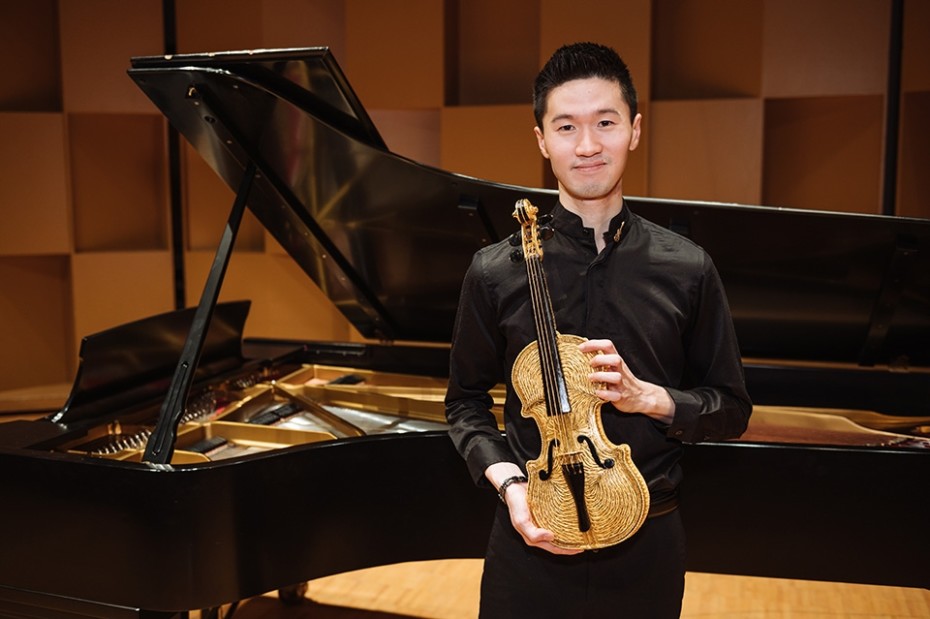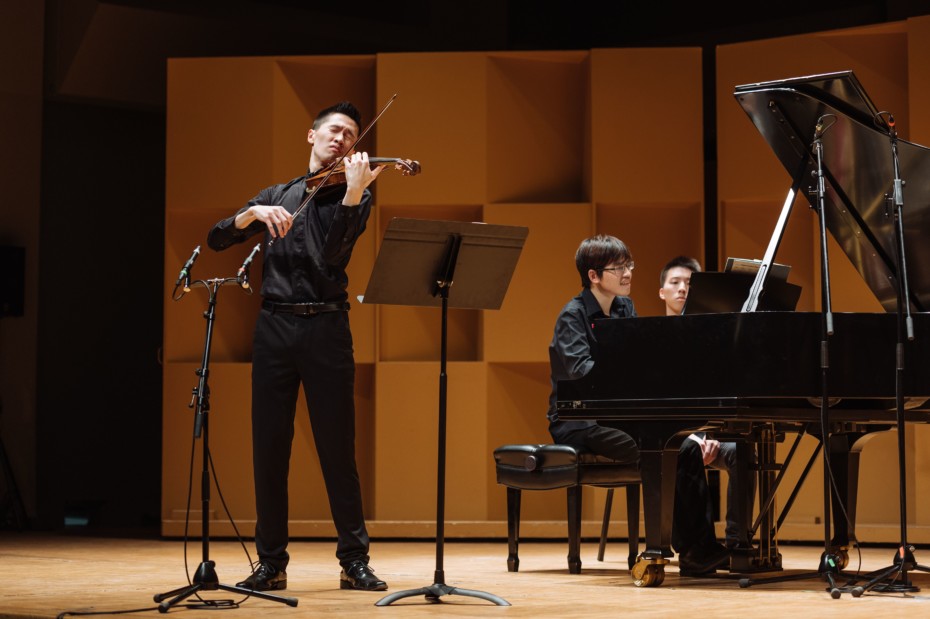
As the last note of Wieniawski’s Original Theme and Variations Op.15 reverberated through Pollack Hall on November 15, violinist Aaron Chan, exited the stage with mixed emotions.
One of three finalists in the annual Golden Violin competition, Chan was the last to perform.
Yes, he felt relieved that the competition, which included a semi-finals recital the day before and a 40-minute performance for the finals, was over. And he was happy that he fulfilled his goal of “playing my heart out.”
But, he was also somewhat disappointed. “Honestly, I didn’t feel that good about my performance because I felt like I made quite a few mistakes,” he said. “I knew that I could play better than that.”
Not many people shared his assessment, including members of the competition jury who, a short time later, named Chan as the winner of the $25,000 first prize.
“The jury was impressed by the level of accomplishment on display with all candidates but Aaron was the unanimous choice for the winner of this year’s Golden Violin Award,” said Douglas McNabney, Associate Dean (Academic and Student Affairs) of the Schulich School of Music and Chair of the Golden Violin jury. “Aaron’s performance was at the highest level expected in major international competitions. We won’t be surprised if he goes on to win one in the very near future. Aaron will be an excellent ambassador for our school – we are very proud of him!”
McNabney wasn’t surprised to hear of Chan’s ambivalence toward his performance. “Perfection is impossible, but the constant striving to achieve it is what motivates,” he said. “It is one of the hallmarks of great artistry.”
Following his teacher to McGill
Born in Toronto and raised in Hong Kong, Chan started his musical journey at the age of five. “I started learning violin because that’s the stereotype [in Hong Kong]. Every kid learns to play an instrument,” said Chan. Just another activity along with swimming and fencing lessons, he said.
But unlike his peers, most of whom gradually stopped playing, Chan fell in love with music. At age 10, he realized that, while swimming and fencing were fun, “there was a special place inside me for music.”
In 2015, Chan went to study at Cleveland Institute of Music. There, he was taught by Jinjoo Cho, an award-winning violinist and passionate teacher. “She’s a really supportive, really dedicated teacher,” said Chan. “She is very intense but in a really good positive way.”
When Cho joined the Schulich School of Music, Chan transferred to McGill in 2017 to finish his undergraduate degree. And while Chan chuckles that the decision “may have been a little hotheaded,” it was one he hasn’t regretted. “My time at McGill has been great,” he says. “The environment at the School is really positive and supportive and the teachers are really high-level. I am really grateful for the opportunities here and I’m definitely growing as an artist.”
Hitting the books right after winning performance
One of those opportunities, of course, has been the Golden Violin competition, which several days after winning, still hasn’t sunk in.
“To be honest, I didn’t know how I felt when I was announced the winner. Everything happen pretty fast and I was pretty tired,” he said. “Right after the competition I had to study for a bunch of exams, so I’m still trying to gather my feelings.”
What Chan appreciates most was the feeling of camaraderie that pervaded the competition. “I know the finalists [violinist Russell Iceberg and cellist Braden McConnell]. They’re fantastic musicians and very nice people,” said Chan. “It was a really nice vibe with absolutely no competitive negativity. Everyone was positive and supportive of each other. It was a great to experience a stressful competition but in a very positive environment like that.”
Next step in his musical journey
Chan practices up to six hours a day, on top of his classes. It’s a rigorous routine that taxes him physically. He has to watch that the repetitive movements don’t lead to injury in his shoulder, arm or hand – a common risk among musicians.
That repetition also wears on him mentally sometimes. “There are always plateaus when you get to a certain level. It’s happened so many times I can’t even tell you,” he says. “You get really tired of it sometimes because you’re playing the same instrument every day.”
What keeps me moving is remembering how music has moved me,” he says. “I remember the positive experiences I had listening to great players when I was in the audience thinking ‘Wow, I really want to do that.’ Those are the moments I want to re-create for other people.”
Chan says the $25,000 prize money will go a long way to helping him continue his musical journey.
“It’s a number that I don’t really understand,” he says with a laugh. “I will be applying for graduate studies next year, so that’s where most of the money will go to. It’s going to help me a lot… I don’t know where I’m going to be but it will set me up very well for my next year of studies.
“The money is great, of course, but the overall experience is something I will remember forever.”

